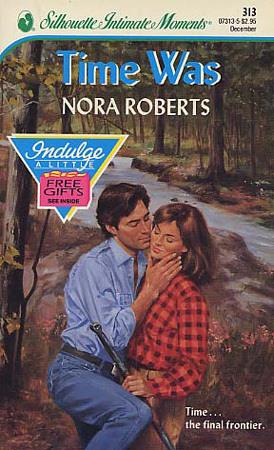Time Was
- by Nora Roberts
- Novel
- Romance
- Adults
- Definite Time Travel
- English
- Time Was by Nora Roberts (Silhouette, November 1989).
Time travel via a spaceship that got too close to an uncharted black hole. Our hero, Caleb Hornblower, survives to have a romance with Liberty Stone, a woman from a couple hundred years before he was born. The romantic element is definitely stronger than the science, but there are some interesting discussions about past versus future technology and different social norms. There’s also a fun ride on an aircycle! And a bit of comedy when Liberty’s parents arrive unexpectedly. But only the one time travel event is documented, so this remains heavier on the Romance than the Time Travel.
The story continues in a 1990 sequel, Times Change.
The story continues in a 1990 sequel, Times Change.
—Tandy Ringoringo
The cockpit lights went out, leaving only the whirl of kaleidoscopic colors from the instrument panel. His ship went into a spiral, tumbling end over end like a stone fired from a slingshot. Now the light was white, hot and brilliant. Instinctively he threw up an arm to shield his eyes. The sudden crushing pressure on his chest left him helpless to do more than gasp for breath.

Tags
(3)
- Time Periods
- Circa AD 1970 to 1999: About 1989.
- Circa AD 2200 to 2299: 2255.
- Time Travel Methods
- High Speed, Angular Momentum, Gravity, Cosmic Strings, etc. Cause Time Warp: Too close to a black hole.
Variants
(1)
- Time Was by Nora Roberts (Silhouette, November 1989).
Translations
(13)
- Bulgarian.
Сега и във времето [Now and in time], as by Нора Робертс (Коломбина Прес, 2004).. . . . . . . . . . . . . . . . . . . . . . . . . . . . . . . written by Nora Roberts as by Нора Робертс. . . . . . . . . . . . . . . . . . . . . . . . . . . . . . . translated by unknown persons [possibly using an alias] - Dutch.
Tijdloze hartstocht [Timeless passion] by Nora Roberts (Harlequin Holland, 2003). - Estonian.
Läbi aja [Through time] by Nora Roberts (ERSEN, 2010).. . . . . . . . . . . . . . . . . . . . . . . . . . . . . . . translated by unknown persons [possibly using an alias] - Finnish.
Aikojen yli [Over time] by Nora Roberts (Harlequin, 2014). - French.
La passagère du temps [The passenger of time] by Nora Roberts (Harlequin, November 2015).. . . . . . . . . . . . . . . . . . . . . . . . . . . . . . . translated by unknown persons [possibly using an alias] - German.
Diesseits der Liebe [This side of love] by Nora Roberts (Weltbild, 2006). - Hungarian.
Egyszer volt . . . [Once upon a time there was . . .] by Nora Roberts (Harlequin Magyarország, 2009). - Italian.
C’era una volta . . . il futuro [Once upon a time . . . the future] by Nora Roberts (Harlequin Mondadori, 1991).. . . . . . . . . . . . . . . . . . . . . . . . . . . . . . . translated by unknown persons [possibly using an alias] - Polish.
Zagubiony w czasie [Lost in time] by Nora Roberts (Arlekin Wydawn, Harlequin, 2011). - Portuguese.
Tempos Esquecidos [Forgotten times] by Nora Roberts (Harlequin, June 2012).. . . . . . . . . . . . . . . . . . . . . . . . . . . . . . . translated by unknown persons [possibly using an alias] - Russian.
Обманутое время [He cheated time], as by Нора Робертс (Центрполиграф, 2010).. . . . . . . . . . . . . . . . . . . . . . . . . . . . . . . written by Nora Roberts as by Нора Робертс. . . . . . . . . . . . . . . . . . . . . . . . . . . . . . . translated by unknown persons [possibly using an alias] - Spanish.
Tiempo atrás [Time past] by Nora Roberts (Harlequin, 2002).. . . . . . . . . . . . . . . . . . . . . . . . . . . . . . . translated by unknown persons [possibly using an alias] - Swedish.
Fångad i tiden [Caught in time] by Nora Roberts (Förlaget Harlequin AB , 2007).. . . . . . . . . . . . . . . . . . . . . . . . . . . . . . . translated by unknown persons [possibly using an alias]
Indexer Notes
(2)
- Release—The ITTDb lists a November 1989 release date, but Roberts’s own site and Goodreads both list December.
- Hungarian title—Egyszer volt . . . is the first half of the phrase Egyszer volt, hol nem volt . . ., which is literally something like “There once was, there once wasn’t . . .” (used idiomatically like “Once upon a time . . . ”). Or if you prefer, there is the commonly used longer version: Egyszer volt, hol nem volt, az üveghegyen is túl, ahol a kurtafarkú malac túr, volt egyszer egy . . . (“Once upon a time, beyond the glass mountain, where the short-tailed pig digs [for food], there was a . . .”). See also the Hungarian Part 2 of Roberts’ duology, . . . Hol nem volt.
